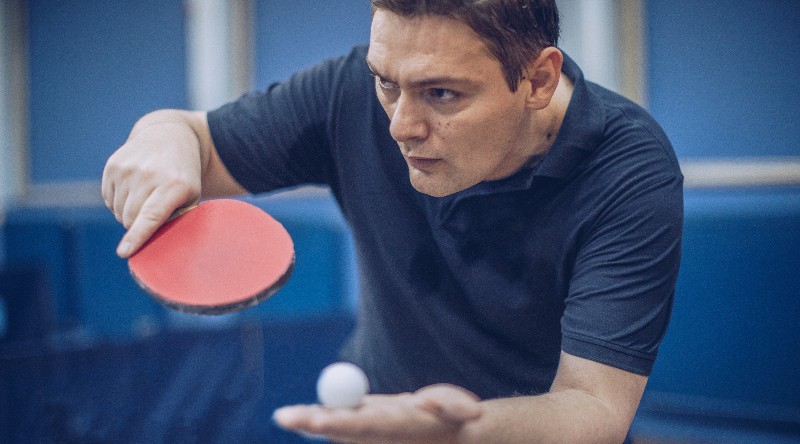
Worrying too much about winning or losing a table tennis match can really increase your anxiety levels. Thoughts usually turn to the worse case scenario – what happens if I lose? How will the loss impact my win percentage or ranking? Will other players think less of me? Before a match has even begun, you have already entered a negative, anxious-filled state of mind. And your performance usually suffers.
When I worry too much about winning or losing, I almost always revert to playing ‘safely’. I’ll stop attacking and use more pushes and blocks and hope the other player makes mistakes. I also notice that I move less and recover slower, waiting and hoping the other player misses.
My performance drops massively. Sometimes I get lucky and the other player does make plenty of errors, but more often than not, my anxious-filled cautious approach ends in defeat, as my opponent takes advantage of my passive play. My primary concern about winning or losing increases my anxiety, makes me play worse and I get the outcome I was trying to avoid – losing!
Set a different goal
To address this, I give myself a different goal. Instead of saying “I must win this match”, I try making my goal something related to my permanence, such as “I’m going to play topspins, instead of pushes”. I then judge my success in the match based upon if I met my goal.
Did I topspin instead of push? If I only played one topspin attack, then I didn’t really achieve my goal. Did I topspin instead of push 50% of the time? Well, that’s not too bad. I had some success in achieving my goal. Did I topspin instead of push 80% of the time? Congratulations to me! I achieved my goal and probably played very well.
How does this reduce anxiety? By not worrying too much about the outcome – will I win or lose? – your anxiety levels will be lower. You will be more relaxed. It will feel more like a training exercise, rather than a competitive match. You will be more mentally alert – trying to find opportunities to succeed in your goal (e.g. topspin rather than push). And of course, if you actually manage to execute a specific skill – topspin rather than push – you’re likely to win more points.
I’ve just given one example here, but your goal could be anything related to your specific game. Other examples of goals may be…
- Serve with more spin
- Use my backhand flick
- Stay low and keep in motion
- Attack down the line
- Keep my chops low over the net
- Counter topspin instead of block
- Focus on reading the service spin
- Attack with more topspin
- Stay closer to the table
- Watch my opponent after each shot
Or anything at all related to how you want to play. The key here is to choose a goal which is related to the process of playing, rather than something which is outcome oriented, e.g. I must win this match.
Limit the negative effects of anxiety
Setting a specific goal for each match won’t make anxiety about winning or losing disappear completely. But your performance won’t be so negatively impacted. By trying to execute a specific skill or tactic, you will immerse your mind in a different challenge.
You stop worrying so much about the score and focus more on your performance. It’s a win-win situation. You play better. You win more points. You increase your chances of winning more matches. Even losses can feel like victories if you are really happy with how you played.
Have a think about some goals you can set yourself in upcoming league matches and tournaments. Actually write some ideas down on paper. And after you have finished a league match or tournament, review the goals you set yourself. Did you topspin rather than push? Was the shot successful? Did it help you win more points? Do you need to work on the technique more in training?
Taking this approach moves your mind away from worrying too much about winning or losing. You will become much more focused on your performance – how you play – and this will lead to a much bigger improvement.
Take your game to the next level
If you are serious about improving your table tennis skills, I recommend you join Tom’s TT Academy. In my online academy, you will get access to a wide range of coaching content, including:
- in-depth courses
- training drills
- video analysis
- fitness videos
- robot training videos
- member discussions
- skill challenges
- and lot’s more!
You can access all this content for less than £1 per week. New content is added regularly. Join hundreds of table tennis players around the world today at tomsttacademy.com
